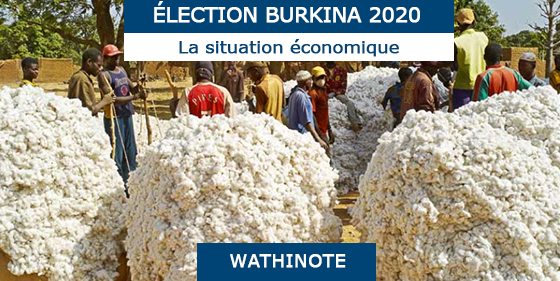

Author: World Bank Group
Publication Type: Report
Date of publication: 2020
Les Wathinotes sont des extraits de publications choisies par WATHI et conformes aux documents originaux. Les rapports utilisés pour l’élaboration des Wathinotes sont sélectionnés par WATHI compte tenu de leur pertinence par rapport au contexte du pays. Toutes les Wathinotes renvoient aux publications originales et intégrales qui ne sont pas hébergées par le site de WATHI, et sont destinées à promouvoir la lecture de ces documents, fruit du travail de recherche d’universitaires et d’experts
- The Covid-19 – a respiratory disease caused by a novel coronavirus – which was detected in Wuhan, China in December 2019 became a pandemic in early March 2020, impacting societies and the economy at a global scale.
- Burkina Faso confirmed the first patient on March 9th, 2020.
- As of August 9th, 2020, the country has a total of 1,213 confirmed cases.
- Luckily the country experienced only 54 deaths and 995 patient recoveries, as a result, as of August 9th, 2020, there are only 164 active cases.
- Though the human cost of Covid-19 in Burkina Faso is still limited, the immediate economic cost is likely to be significant.
- The WB is projecting a negative growth due to the COVID-19.
- Beyond the health response, the Authorities are yet to design and implement emergency measures to mitigate socio-economic impact of COVID-19.
- Other countries around the World are taking bold actions such as:
- Scaling up of existing social protection
- Providing unemployment benefits
- tax relief
Objectives of the High Frequency Phone Survey of Households
- To monitor the socio-economic impacts of the COVID-19 pandemic with a focus on earnings, employment, health, education, food security, as well as copping strategy, including safety nets. The survey instrument was designed to be country specific, but also to allow for international comparisons given that the WB has launched similar initiatives in several countries around the World.
- The WB worked jointly with the Institut National de la Statistique et de la Démographie (INSD) for the design and implementation of the survey.
- Data collection for the 1st round (which is the subject of this presentation) took place between June 9th and July 1st, 2020
Key Findings (II) Employment and Income
- Around 10% of respondents used to work before the Covid-19 outbreak but are not working now. Fear of Covid-19 is the second most important reason for stopping work.
- The economic slowdown due to the COVID-19 has translated in an economywide reduction of income; most employees, non-farm businesses and farm activities experienced a reduction of income.
- Wage earners who were not able to work as usual were directly affected by reduction of their income as they were not paid.
- The vast majority of non-farm businesses (72.5%) experienced a reduction of income since March 16th. Non-farm businesses operating in industry and services were most affected. Closure due to Covid-19 and lack of customer are the main reasons for the lower income of non-farm businesses.
- Since mid-March, most farmers (90.1%) are having difficulties in their activities mainly due to seasonality and Covid-19 related restrictions.
- Close to half of farmers reports a reduction of prices at which they sale their products. WFP reported in April that food items prices were generally stable despite increase in transport costs. Lower farm gate prices, higher transport costs and stable market prices, point to a possible transmission of increase transport costs to farmers. It means the way COVID affects prices along the value chain will mainly harms farmers (or net producers).
- About 1 in 5 households used to receive remittances from family/friends, and for most, the amount received has reduced since the Covid-19 outbreak.
